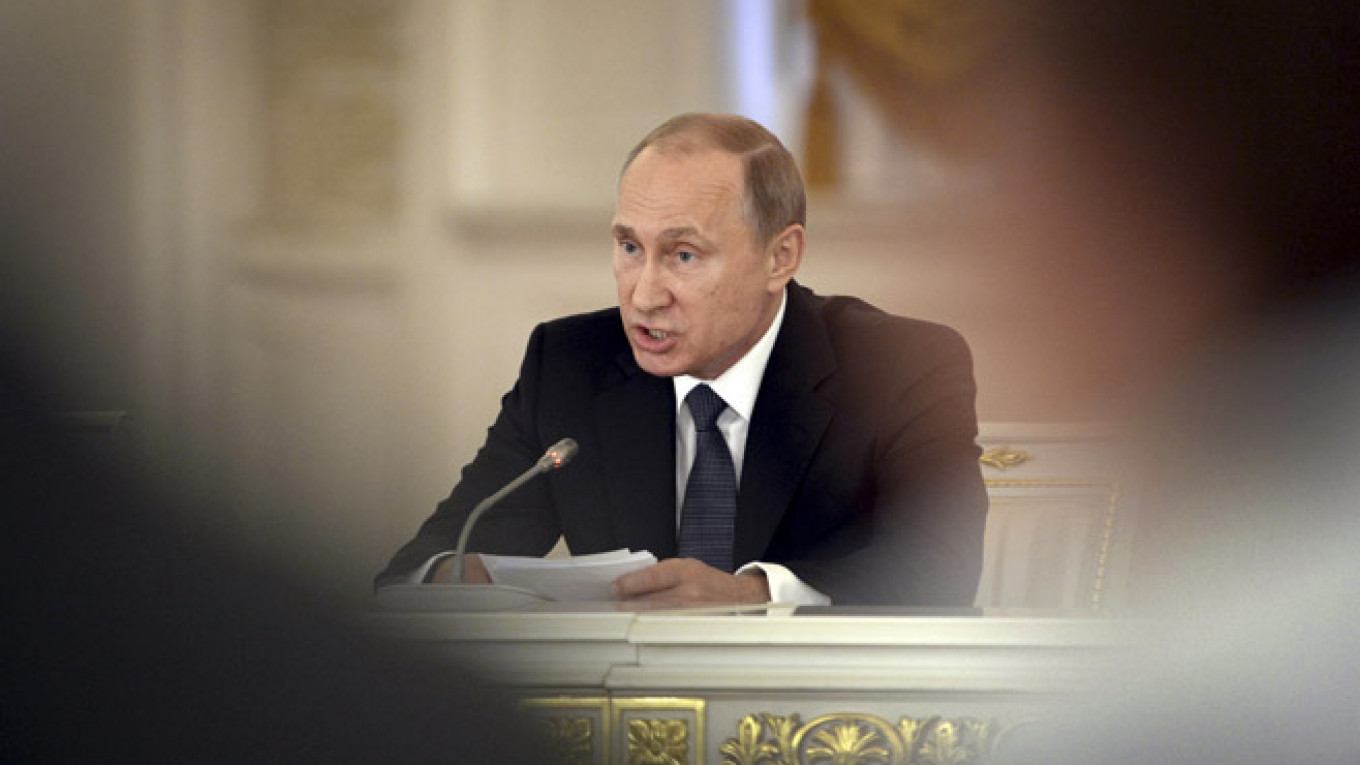Обосно́ванно: justifiably
Here at The Moscow Times language desk, we like to keep on top of the latest language trends and policies. So it was of course with great confusion — er, interest, that we listened to President Vladimir Putin discuss сбережение русского языка (the preservation of the Russian language) at a joint meeting of the councils of interethnic relations and the Russian language.
Not all of it was confusing, of course. We got the bit about the poor Russian language skills on exhibit in all the places that we like to hang out. It's in the media, Internet and television where "всё чаще нарушаются языковые нормы, встречается элементарная неграмотность." (The rules of the language are being broken more often, and there is outright illiteracy.) This made me happy, since now when I pick up bad language habits online, I can refer to the official finger-pointer-in-chief.
The president also said that one of the main threats to the preservation of the Russian language was when those badly educated media folks "необоснованно используют избыточные иностранные заимствования" (use excessive foreign borrowings without justification). Here I heartily agree, although perhaps for a slightly different reason — clarity. There's nothing wrong with professional argot among your peers, such as diplomats using a bit of Russlish as they say "имплементация соглашений" (implementation of the agreement). But if you want a broad audience of Russian speakers to understand what on earth you're talking about, выполнение соглашений is the better way to go.
And I have to say that one of the first media accounts I read on Putin's comments seemed to illustrate the righteousness of his criticism. He was quoted as saying that journalists используют необоснованные иностранные слова (use unjustified foreign words), which is both ungrammatical and a misquotation. Other participants in the meeting pointed their fingers at блатную речь чиновников (bureaucrats who talk like a gang of criminals) and illiterate university graduates. Listening to them, you'd think everyone in the country talked like, well, me. Кошмар! (What a nightmare!)
So the кто виноват (who is to blame) part was clear, but the что делать (what is to be done) part got confusing. The president proposed that everyone "подумать о совершенствовании законодательной базы в этой сфере" (think about how to improve legislation in this area). In fact, he proposed a major group think: "Делать это надо взвешенно и при самом широком общественном обсуждении всех народов России." (This should be done prudently and with the widest possible public discussion of all the ethnic groups in Russia.) None of this ведомственный отраслевой подход (narrow, sectoral approach) stuff, he said.
That's the bit I don't get: how this problem is going to be legislatively fixed, with or without the input of the masses. I got giddy at the thought of Общественный комитет по выявлению необоснованно заимствованных слов (the Public Committee for the Detection of Unjustifiably Borrowed Words). Actually, written laws have never been able to control how people use a language. But don't despair. Russia has about 140 million language legislators who make up the rules of Russian as they speak the language every day. So if the majority of these language legislators don't want a word — out it goes.
As one Russian linguist said about the centuries of Russian language development: "Слова, которые были нужны, адаптировались, которые не были нужны, исчезли." (Words that were needed were adapted, and those that weren't disappeared.)
Problem solved with Russian. Now how about those other languages spoken here?
Michele A. Berdy, a Moscow-based translator and interpreter, is author of "The Russian Word's Worth" (Glas), a collection of her columns.
A Message from The Moscow Times:
Dear readers,
We are facing unprecedented challenges. Russia's Prosecutor General's Office has designated The Moscow Times as an "undesirable" organization, criminalizing our work and putting our staff at risk of prosecution. This follows our earlier unjust labeling as a "foreign agent."
These actions are direct attempts to silence independent journalism in Russia. The authorities claim our work "discredits the decisions of the Russian leadership." We see things differently: we strive to provide accurate, unbiased reporting on Russia.
We, the journalists of The Moscow Times, refuse to be silenced. But to continue our work, we need your help.
Your support, no matter how small, makes a world of difference. If you can, please support us monthly starting from just $2. It's quick to set up, and every contribution makes a significant impact.
By supporting The Moscow Times, you're defending open, independent journalism in the face of repression. Thank you for standing with us.
Remind me later.








